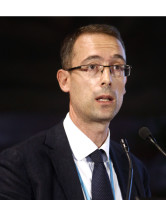Longevity, Ageing and Long-term Care
Economics & Global Development
Behavioral Economics & Decision Sciences
Macroeconomics
Healthy Ageing & Longevity
Econometric Models & Mathematics
Post-Doctoral Fellowships
Luxembourg
2009.08.31
Age-specific mortality, health and economic growth : an endogenized life expectancy
In many countries, life expectancy increases partly due to investment in national public health policies. Yet, understanding what this investment implies in terms of individual economic behavior and growth is still an open question. Not only is Dr. Diene tackling these issues with sophisticated statistical models, but she is also addressing the challenge of studying both developing and developed countries.
Her work will help us better understand how the ongoing changes in age-specific mortality influence economic dynamics both at individual and national levels.
How Old Do You Buy?
Biography
Bity Diene is a Senegalese citizenship. She obtained a bachelor in 2001, a Master in 2003 and a PhD in economics in 2007 from University of Strasbourg (France), where she also was a research and teaching assistant in mathematics and statistics. At the same time, she was a long term visiting researcher (2003-2007) at IRES, University Catholic of Louvain (Belgium). Before joining University of Strasbourg, she started her high education at University Cheikh Anta Diop in Dakar (Senegal). She was regularly granted: research allowance of the French Ministry of education and research (2003-2006), scholarship of the University Agency of the French-speaking World (2000-2001), scholarship of the Senegalese national Ministry of education (1996-1999). Bity Diene is specialized in macroeconomics and economics growth theory. Her main research interests are: growth and development (health, education and demography), macroeconomic modelling and applied econometrics. Her contributions have been presented in international conferences in economics and published in scientific reviews such as The International Journal of Ecology and Development, Mathematical Population Studies, International Journal of Economic Theory.
Project
My current research focuses on growth and development (health, education and demography), and macroeconomic modelling. Debate on health policy often focuses on limiting the growth of health spending, and calls for the question whether growth of health spending is a rational response to changing economic conditions notably the growth of income per person as lifetime increases. Indeed, the intuitions behind the issue raised by age-dependent mortality rates taken in a more realistic modelling are absolutely crucial. Because people with different ages have different lifetimes, they will have different effective planning horizons, and notably different saving decisions. In the context of standard preferences (asset pricing, labour supply, etc) widely used in economics to study consumption, the financing of health expenditures becomes an economic behaviour, the risk of which must be assessed. Moreover, in a general equilibrium perspective, the supply side of the economy can lead agents to trade-off between private and public insurance, and even a mixing of the two.

I have contributed on these topics highlighting some key aspects in the modelling of epidemics for economic growth. I also build projected data combined with a theoretical modelling to capture crucial consequences of the AIDS pandemic such as the fall in life expectancy, the decline in schooling time and labour productivity, in addition to other dramatic effects on saving incentives. I also investigate the interactions between longevity and economic growth. In particular, I show the growth enhancing effect of longevity at low levels of development and longevity, by incorporating various demographic structures.
Impact of the AXA Funding
The ambitious challenge of my post-doctoral project financed by AXA lays on public and private health expenditures, also on the instantaneous probability of death, labour productivity, life expectancy, savings and all variables which are age-dependent. Models proposed in this project allow investigating a wide range of subjects, from demography and the underlying problems such as mortality to economic problems such as produc tivity of workers and the agents' consumption and savings behaviour.
Two main problems are raised, the first one concerns the impact of public and private health spending on the economic growth in developed countries, but also problems generated by longer life expectancy. And the second one concerns what happened or could happen in the developing countries. The project consists in endogenizing life expectancy via public and private health expenditures. This would provide a richer (and more realistic picture) of the relationship between life expectancy and economic growth. Admittedly, a substantial part of the rise in longevity registered in the twentieth century is due to rising (and more efficient) health expenditures, which was in turn made possible by better economic conditions. Incorporating health expenditures in the set-up will then result in a better and more precise appraisal of the relationship between longevity and economic growth.
To this end, AXA Research Fund makes all the difference for me. Indeed, the research proposal (building upon the topics of measuring and assessing risk, modelling the behaviour of economic agents in the face of risk and health economics) will clearly address policy issues which can be of relevant interest to insurance companies. A grant from a private insurance company like AXA to pursue the works that I began during my thesis is very gratifying, because it means that my research can interest beyond the public sphere. And to obtain this grant from AXA with its world-renowned can be only a pride and an honour for me.
To add or modify information on this page, please contact us at the following address: community.research@axa.com

Bity
DIENE
Institution
Université du Luxembourg
Country
Luxembourg
Nationality
Senegalese
Related articles
Longevity, Ageing and Long-term Care
Societal Challenges
Demography
Emerging Market
Income & Wealth
Inequality & Poverty
Joint Research Initiative
United States
2018.04.30
Mortality: towards reliable estimates in developing countries
Getting the most out of unreliable data, and actuarial applications Indeed, by attempting to prove that the mortality datasets available... Read more

Magali
BARBIERI
University of California - Berkeley
Longevity, Ageing and Long-term Care
Prevention & Personalised Health
Healthy Ageing & Longevity
Genetics & Omics
Post-Doctoral Fellowship
United Kingdom
2017.06.30
Longevity : do you have the genes for it?
The investigation of ageing genes is a very active topic of research, but a very challenging one. « This kind... Read more

Peter
JOSHI
